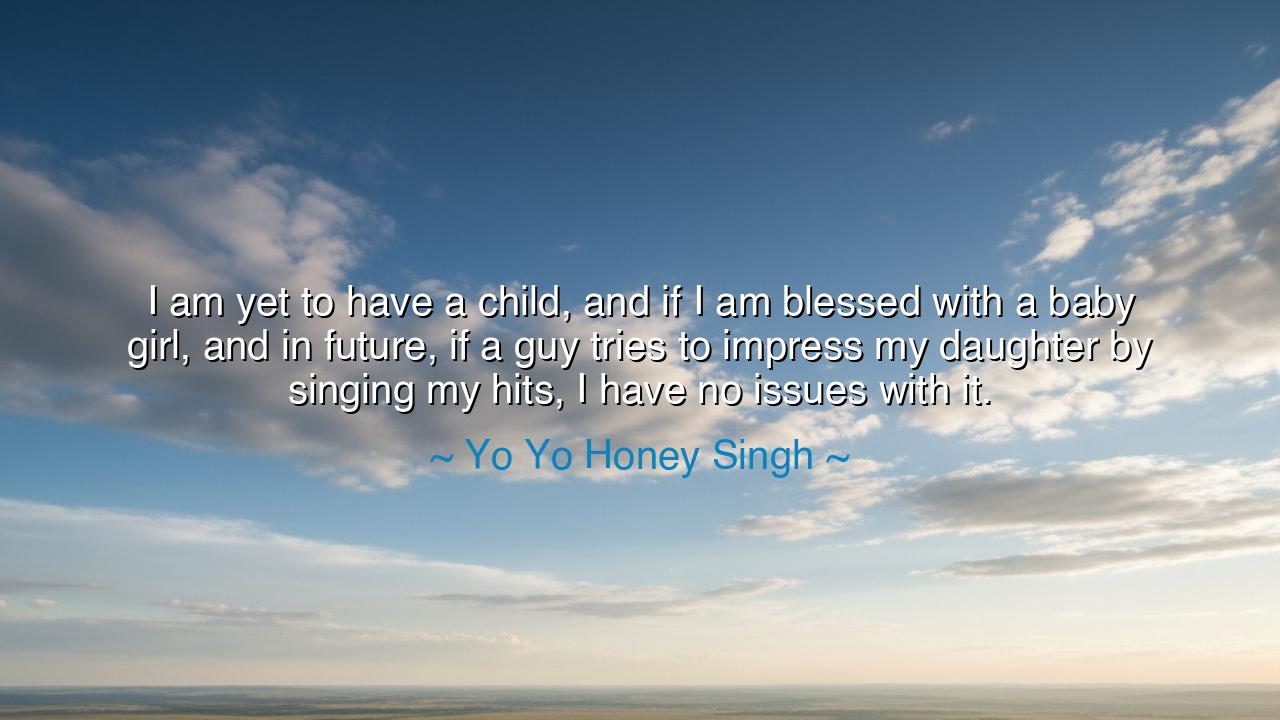
I am yet to have a child, and if I am blessed with a baby girl
I am yet to have a child, and if I am blessed with a baby girl, and in future, if a guy tries to impress my daughter by singing my hits, I have no issues with it.






"I am yet to have a child, and if I am blessed with a baby girl, and in future, if a guy tries to impress my daughter by singing my hits, I have no issues with it." – Yo Yo Honey Singh.
In this thoughtful reflection, Yo Yo Honey Singh speaks to the universal experience of parenthood, love, and the bond between generations. His words reveal an openness to the idea that the music he creates, which has become a part of his legacy, will eventually be passed on to the next generation. Rather than viewing his music as something solely personal, he embraces the idea that it may become a part of his daughter's life, even in the context of a young man trying to win her affection. In this, Singh reveals a deeper sense of self-assurance, seeing no threat in this interaction but rather a natural extension of the connection he has made through his art.
In the ancient world, the idea of legacy was central to how people viewed their lives and the meaning of their actions. Plato, in his discussions of the good life, emphasized that a person’s true worth is often measured by what they leave behind—whether through wisdom, virtue, or deeds. For many in ancient cultures, sons and daughters were seen as the bearers of family legacy, the ones who would carry forth the name, the stories, and the values of the elders. In this sense, Singh’s acceptance that his music might be a means of connection between his daughter and a potential suitor is both an acknowledgment of the power of art and a reflection of how personal legacy is often shaped by those we love.
Consider the example of Homer, the ancient Greek poet, whose works like the Iliad and the Odyssey were passed down through generations. Though Homer himself may not have known how far his words would travel, his stories became a cornerstone of Greek culture, influencing countless generations. Homer’s tales were not just about the heroic deeds of ancient figures but about the values they embodied—courage, wisdom, and honor. In the same way, Singh’s music, whether one views it as contemporary or a reflection of his artistic soul, becomes part of a broader legacy that transcends time. His willingness to allow his art to be used by others, even in a playful or romantic context, reflects an acceptance of how his work can evolve beyond him.
The idea of legacy through children was also deeply ingrained in the traditions of kings and philosophers in ancient societies. The Egyptian pharaohs, for instance, built monumental tombs, pyramids, and statues not just for their own glory, but to ensure their legacy lived on through the ages. They understood that their power would eventually pass to their children, who would carry forward their name, culture, and accomplishments. Singh’s perspective is a more personal and modern one, but it still resonates with this deep understanding of how we, as individuals, contribute to something greater than ourselves. Whether it is through our art, our character, or our children, the future often reflects our influence in ways we cannot control but can embrace.
In Singh’s acceptance of his music being used to impress his daughter, there is also an understanding of the inevitability of change. Just as the ancient civilizations passed their music, stories, and values to their descendants, Singh recognizes that the connection between generations is built not on resistance but on adaptation. The world changes, and new generations find their own ways to connect with the past. Music is a particularly powerful medium through which this happens, and Singh’s acknowledgment that his songs might serve as a bridge between his daughter’s world and a future companion reflects a wisdom that transcends time: we do not own the legacy we create; we merely offer it, and the world takes it in its own way.
The true lesson in Singh’s words is one of humility and acceptance—understanding that our creations, our legacies, and our actions will outlive us in ways we cannot control. In his openness to the idea that his music may play a role in his daughter's life, even in the playful context of romance, Singh speaks to the beauty of creation that is shared, adapted, and passed down. We, like him, must understand that while we may have certain intentions for our legacy, the future will take it and shape it into something that belongs to the generations that follow.
In our own lives, we must learn to embrace the impact we have on those we love and on the world around us. We should create, love, and live with the knowledge that our influence may go far beyond what we envision. As parents, creators, and individuals, let us not become possessive of our legacies but instead celebrate the ways they can be shared and passed on. Just as Singh embraces the future potential of his music, we too can take pride in knowing that the marks we leave on the world may become part of a greater story—one that transcends time and generations.






AAdministratorAdministrator
Welcome, honored guests. Please leave a comment, we will respond soon